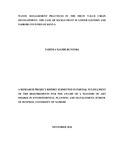| dc.contributor.author | Runyora, Tabitha N | |
| dc.date.accessioned | 2017-01-06T09:14:19Z | |
| dc.date.available | 2017-01-06T09:14:19Z | |
| dc.date.issued | 2016-11 | |
| dc.identifier.uri | http://hdl.handle.net/11295/99588 | |
| dc.description.abstract | The study on waste management practices in the mango fruit value addition chain involved three kinds of population; the farmers, processors and the marketers. The target sites were based in countryside and urban areas where the fruits are produced and marketed respectively. The study objectives were meant to identify and analyze the type and quantities of waste generated during mango fruit production and value addition processes and investigate the influence of the mango fruit waste disposal methods on the environment.
The study utilized the interview guide as the methods of data collection from the targeted interviewees. The researcher managed to gather information from 86 interviewees which gave a response rate of 78% of the targeted population. The information was therefore adequate for analysis. The study revealed that the basic proportion of mango fruit that goes to waste is relatively between (30-50%). More waste is generated during production (26%) and distribution (24%) the mango fruits than when the fruit is in the hands of the processors.
The most applicable methods of waste disposal are decomposing the excess byproducts from the mango fruit, animal feeding, and planting back the mango seeds, use of garbage bins and land-filling. Wash-water is mainly recycled and the solid wastes disposed in the garbage sites.
However large population shows low satisfaction level with the current performance of the authority that should control the waste disposal in the fruit processing sector. This implies that more effort should be put to minimize the amount of waste generated, promote re-use of waste products and also enforce rules that should control the amount of waste products disposed into the environment. The study recommends that waste management should be considered not only as an individual issue but also as a corporate issue that should be put at everyone‘s concern. There is need to create awareness to every intermediary involved in processing and consumption of mango fruits on the importance of managing and utilizing the waste generated from processing and consumption of the fruit. Waste disposal should be everyone‘s concern at all times for the need to conserve the environment. | en_US |
| dc.language.iso | en | en_US |
| dc.publisher | University of Nairobi | en_US |
| dc.rights | Attribution-NonCommercial-NoDerivs 3.0 United States | * |
| dc.rights.uri | http://creativecommons.org/licenses/by-nc-nd/3.0/us/ | * |
| dc.subject | Waste management practices | en_US |
| dc.title | Waste Management Practices in the Fruit Value Chain Development: the Case of Mango Fruit in Lower Eastern and Nairobi Counties of Kenya | en_US |
| dc.type | Thesis | en_US |



